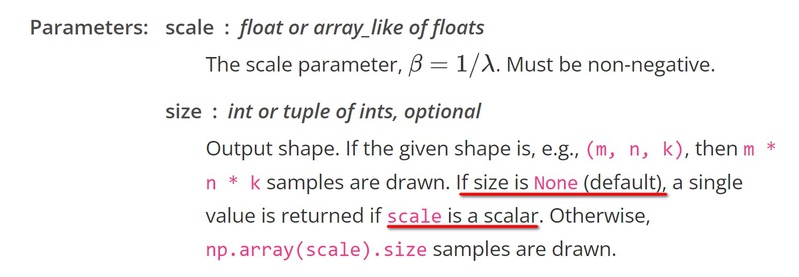Exponential random in python
Basically we can just use numpy.random.exponential:
| from numpy import random | |
| random.exponential(scale=10, size=None) |
To get scalar from this function we pass size=None according to numpy doc:

Let's run this example on 1k elements and see min / max / mean:
| from numpy import random | |
| import statistics | |
| all_nums = [random.exponential(scale=10, size=None) for _ in range(int(10e3))] | |
| print('MIN', min(all_nums)) | |
| print('MAX', max(all_nums)) | |
| print('AVG', statistics.mean(all_nums)) | |
| print('EXAMPLE\n\r', "".join([f"{v:>5.1f}" for i, v in enumerate(all_nums[:30])])) |
We got:
| MIN 0.0029298785466956444 | |
| MAX 86.84156021476537 | |
| AVG 9.945727975597245 | |
| EXAMPLE | |
| 17.4 1.5 3.6 4.1 8.7 16.8 | |
| 20.1 6.0 2.7 33.3 6.5 0.9 | |
| 1.7 0.6 0.8 21.7 1.9 6.9 | |
| 2.1 12.0 20.6 0.8 8.9 21.0 | |
| 11.5 1.1 35.8 1.7 12.5 8.7 |
As you can see on scale of 10 on 10k elements we got:
- min: ~0
- max ~86
- so median is 43
- when mean is 9.9
On 100k elements I got:
| MIN 0.0020912108793156 | |
| MAX 95.02249624840809 | |
| AVG 11.866217176280955 |
PS: There is no maximum end because in theory with super-small probability we can get infinity value, but as you can see on 10k draws we able to get value up to 100 on scale 10.
If you need values to start from e.g. 1, just add 1 to the result of function
